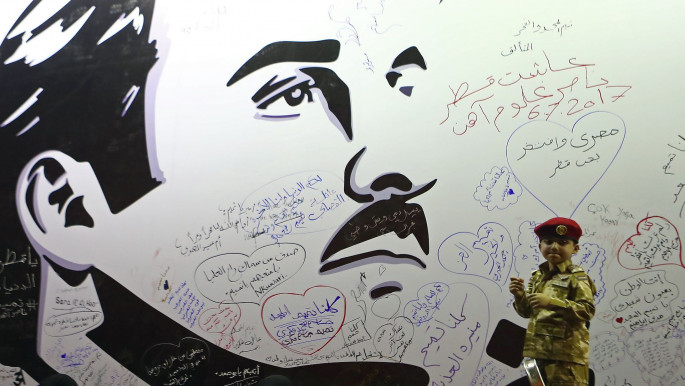Visiting Doha, Tillerson calls Qatari position 'reasonable'
US Secretary of State Rex Tillerson told reporters in the Qatari capital Doha on Tuesday it had "reasonable" views in the month-old diplomatic crisis with Arab neighbours.
"I think Qatar has been quite clear in its positions, and I think those have been very reasonable," Tillerson told reporters.
Tillerson will later be taking part in a joint meeting with Qatari and Kuwaiti leaders, according to reports.
US Secretary of State Rex Tillerson is in Qatar on a mission to break the deadlock between the tiny, energy-rich Gulf nation and four Arab neighbours that is seriously straining relations among the American allies.
The visit is Tillerson's second stop on a shuttle-diplomacy circuit that is also expected to take him to Saudi Arabia, which shares Qatar's only land border and is the most powerful of the four countries lined up against it.
He met with Qatar's 37-year-old emir, Sheikh Tamim bin Hamad Al-Thani, upon arrival in sweltering Doha.
The pair were joined by Qatar's foreign minister as well as the emir's brother, Sheikh Mohammed bin Hamad Al-Thani, a key point person for the United States on counterterrorism issues.
Qatar was the second Gulf stop for Tillerson, a former oilman with years of experience in the region. He met with Kuwait's ruler, Sheikh Sabah Al Ahmed Al Sabah on Monday.
The Kuwaiti leader has been acting as a mediator between Qatar and the quartet of Saudi Arabia, Bahrain, the United Arab Emirates and Egypt.
The four nations broke off relations with Qatar and cut air, sea and land routes with it in early June accusing the country of supporting extremist groups. They later issued a 13-point list of demands to restore relations and gave Doha 10 days to comply.
The demands include Qatar shutting down news outlets, including the media network Al Jazeera, cutting ties with Islamist groups such as the Muslim Brotherhood, limiting ties with Iran and expelling Turkish troops stationed in the country.
Qatar strenuously denies supporting extremist groups and has rejected the demands, saying that agreeing to them wholesale would undermine its sovereignty.
 |
Tillerson's arrival in the Gulf coincided with the release by CNN on Monday of allegedly leaked agreements between Qatar and its neighbours dating from 2013 and 2014 |  |
CNN leaks
Tillerson's arrival in the Gulf coincided with the release of allegedly leaked agreements between Qatar and its neighbours dating from 2013 and 2014 by CNN on Monday.
 |
| Read more in The New Arab Qatar downplays CNN leaks of Riyadh-agreement |
They include a handwritten 2013 deal between the leaders of Saudi Arabia, Kuwait and Qatar to not interfere directly or indirectly in the internal affairs of fellow members of the six-nation Gulf Cooperation Council, which also includes Bahrain, Oman and the UAE.
That agreement specifically ruled out support for the Muslim Brotherhood and other unnamed groups that could threaten the bloc's members.
Qatar sees the Brotherhood as a legitimate political force and has for years hosted its spiritual guide, Sheikh Youssef al-Qaradawi. That puts it squarely at odds with Saudi Arabia, the UAE and Egypt, which see it as a threat and label it as a terrorist organisation.
The four anti-Qatar countries lent credibility to the authenticity of the leaked agreements in a statement issued early Tuesday. The network said it received the documents from a source in the region.
They asserted that the documents "confirm beyond any doubt Qatar's failure to meet its commitments and its full violation of its pledges." Their 13-point list of demands in June was tied to those earlier deals and was "fully in line with the spirit of what was agreed upon," they said.
The head of Qatar's government communication office, Sheikh Saif bin Ahmed Al-Thani, disputed that, saying the June demands "bore no relation to the Riyadh agreements," according to a statement carried by the official Qatar News Agency. He called the "siege" by the four states a violation of the GCC charter.
Commentators have meanwhile suggested the documents were deliberately leaked by the blockading countries ahead of Tillerson's visit to Qatar, to pile pressure on Doha to accept their demands and deter the US from pressuring them to soften their position.
US officials have said Tillerson does not expect an immediate breakthrough in the dispute and cautioned that a resolution could take months.
A senior adviser to Tillerson, R.C. Hammond, has said the demands on Qatar were not viable but that there were individual items on the list "that could work." He did not elaborate.
Qatar is not new territory for Tillerson. Before being tapped to be US President Donald Trump's top diplomat, he served for years as CEO of Exxon Mobil.
The Irving, Texas-based oil giant is one of the most dominant players in OPEC member Qatar's energy industry, and played a major role in turning it into the world's largest producer of liquefied natural gas.





 Follow the Middle East's top stories in English at The New Arab on Google News
Follow the Middle East's top stories in English at The New Arab on Google News


